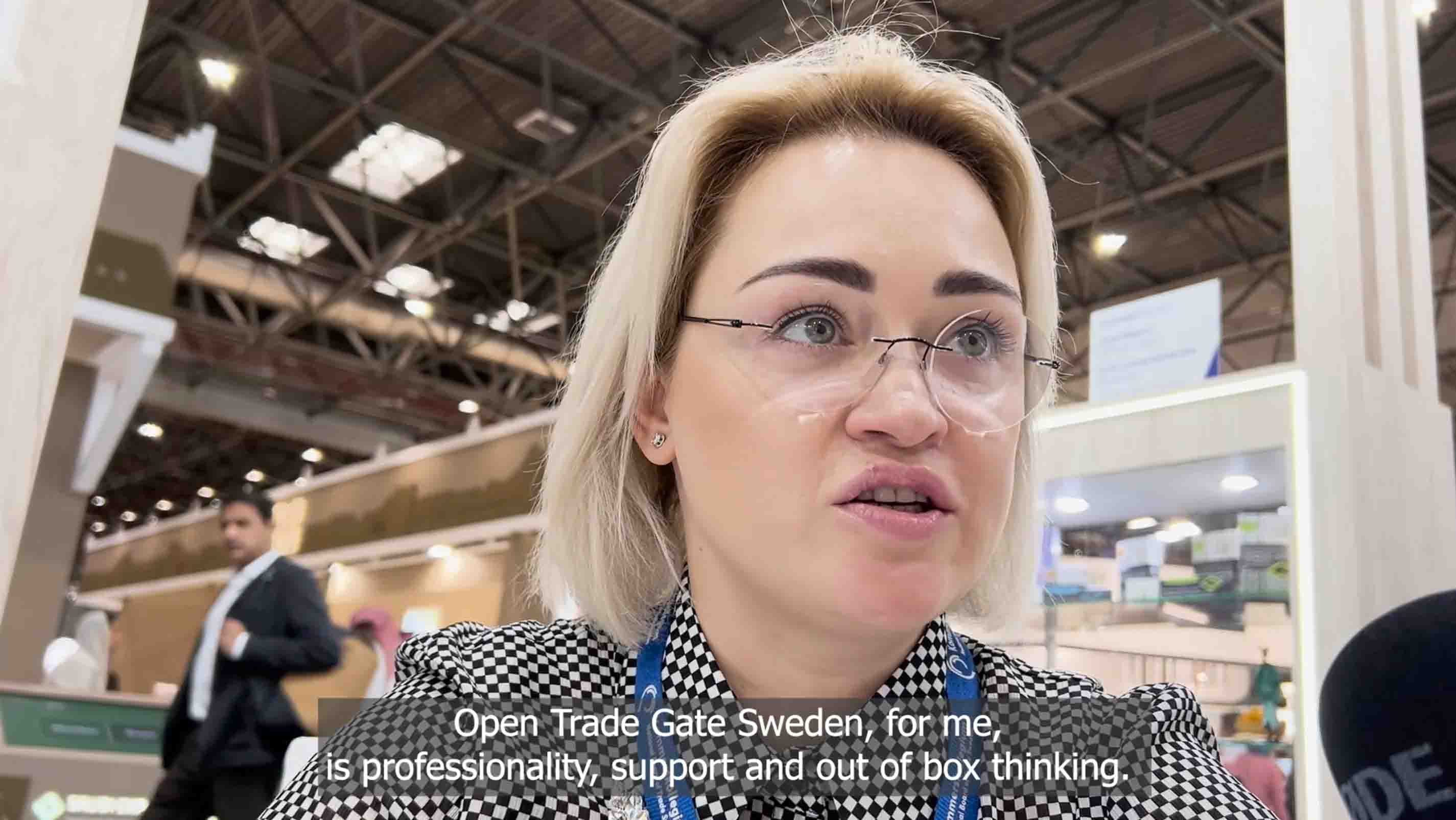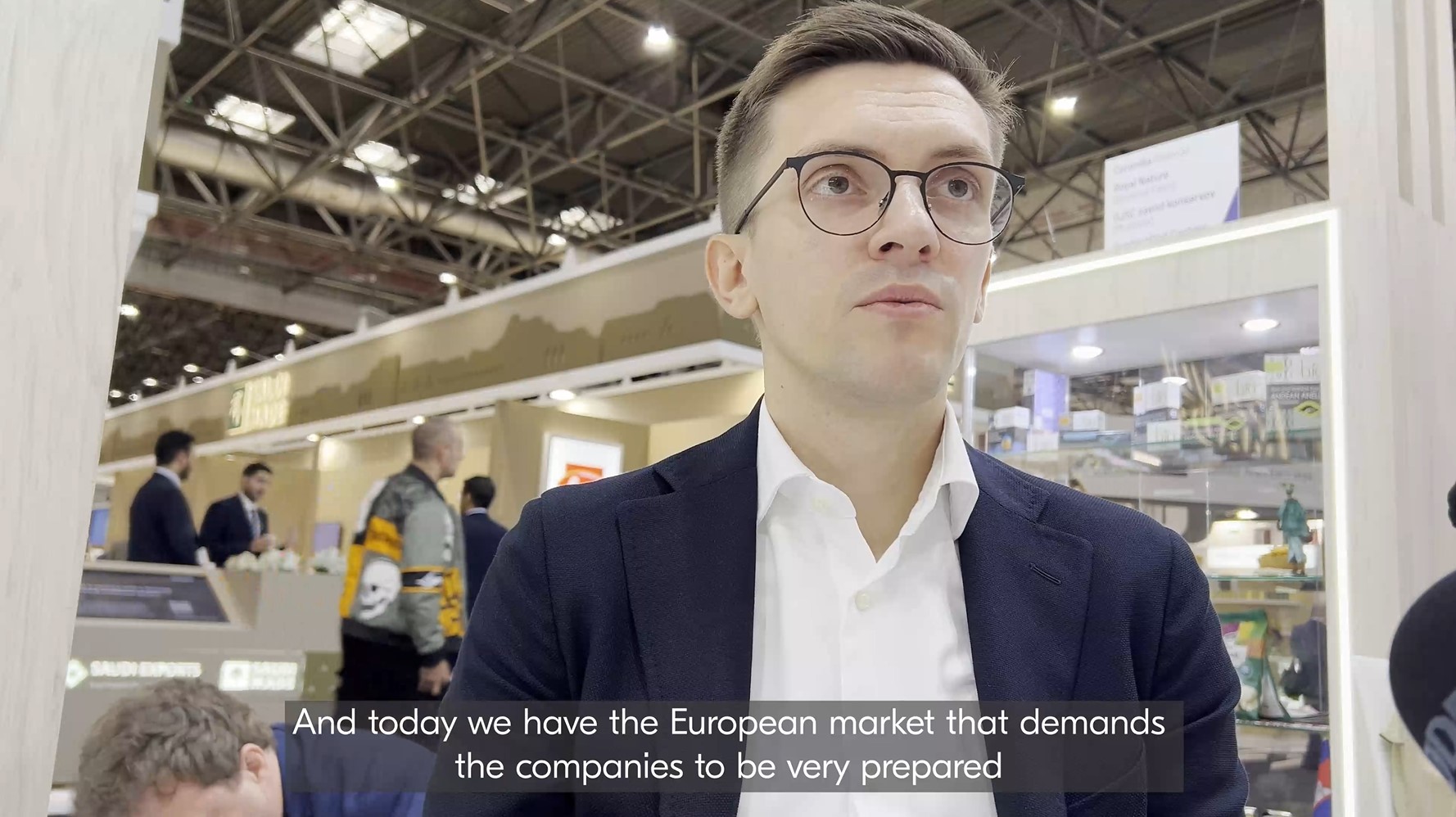Ukrainian food companies explore Swedish market with OTGS support
A Ukrainian food business is working to expand its exports to Sweden and the EU, receiving guidance and support from Open Trade Gate Sweden (OTGS). By participating in trade fairs and gaining insights into market requirements, this business is taking important steps towards establishing a presence in the Swedish and the EU market.
Help to establish as many contacts as possible
Based in Zhytomyr, ALTE Foods LLC is a rising star in the frozen berry industry. Despite being only three years old, this innovative company recently secured a contract with a Belgian buyer during the SIAL trade show in France.
Ievgen Lomtiev, the company’s export sales manager, credits OTGS for providing financial backing and expert consultancy, enabling them to present their high-quality products effectively.

Ievgen Lomtiev from ALTE Foods describes Open Trade Gate Sweden in three words.
“The support from OTGS has been really valuable,” says Ievgen. “Besides the financial part, there is a lot of additional support by the consultants, like organising meetings, matchmaking, sales coaching. The consultants want for us to get as many contacts and as much new business as we can.”
The support has helped the company strengthen its export strategy and build sustainable business relationships.
A consultancy boutique with focused services
Budmo Zdorovi focuses on gluten-free and lactose-free snacks for health-conscious consumers. Established in 2016, the company initially targeted the Middle Eastern market before shifting focus to the EU and North America. OTGS has played a significant role in supporting this transition by offering consultancy on market preparation and regulatory compliance.
“Open Trade Gate Sweden is like a consultancy boutique with very focused services”, says Ruslana Rymarska, the company’s founder. “They give very valuable advice about the product, about how to negotiate with a retailer, how to make a road map, what we may need to improve in our product or in our business approach or presentation.”

Ruslama Rymarska from Budmo Zdorovi talks about how OTGS helps businesses grow.
Budmo Zdorovi’s journey with Open Trade Gate Sweden began with participation in the GastroNord fair in Stockholm, where OTGS helped Ruslana refine her export strategy.
“I applied to the programme, and my company was chosen to participate in GastroNord where we had some successful meetings”, shares Ruslana. “We also understood that we have a homework to prepare, to adapt the product to the market by labelling not only in English, but also to suggest a Swedish version.”
The company has engaged with key Swedish market players, including ICA, and is in discussions with distributors looking to expand their product offerings.
Internal efforts needed to maximise the support
Slow Walnuts is a Ukrainian company specialising in premium-quality, naturally dried walnuts, grown and gathered by low-income Ukrainian families. With increasing consumer demand for healthy and sustainable food products, the company sees Sweden as a strategic market for expansion.
“We need more conscious consumers who are making their purchasing decision based not only on the quality or price, but also are worrying about the way the product was grown and from where it comes,” says the co-founder Oleg Moroz. “Obviously, these kinds of products are not very accessible to countries with lower economic development, so we need conscious consumers with high purchasing power, and Sweden was in line with these criteria.”

Oleg Moroz from Slow Walnuts advises companies on exporting to Sweden and the EU.
Despite being founded in 2023, the company has already attracted the interest of Axfood, one of Sweden’s largest retailers. Shortly after, it was approved as a supplier for Unil, one of the biggest grocery chains in Norway.
“Unil is distributing to Norway, Sweden and Denmark. It is a big opportunity to save time, because it is not easy to make contact with retailers: they are very resistant to new companies, because everybody wants to sell to them.”
In addition to increasing its exports, Slow Walnuts aims to build a sustainable brand that offers traceability between gatherers and consumers using modern technology like blockchain. When this technology becomes available, customers will be able to know exactly which family their walnuts come from and will be able to support that family directly if they wish.
“We can use blockchain technology even today, because we already have a partner and it is not something innovative. But the main challenge is the law in Ukraine”, explains Oleg. The families that provide walnuts to the company are identified as sellers by the government and have to pay a tax. At the same time, they receive different forms of government support as low-income citizens and are afraid to lose access to that.
Oleg stresses that OTGS support has been invaluable, but he advises companies to make the most of it to maximise the support for long-term success. “I think that to make it work, we need the efforts of both sides.”
Advice for future exporters and business model adaptation
The experiences of ALTE Foods, Budmo Zdorovi and Slow Walnuts highlight key lessons for Ukrainian businesses aiming to enter the Swedish and EU markets. One of the most crucial takeaways is the importance of preparation, adaptation, and leveraging consultancy support.
Ievgen Lomtiev from ALTE Foods emphasises the value of trade fairs and personal interactions in building trust with buyers. “It is the only possibility to meet with potential customers to discuss cooperation, because it is much better to speak with people in person and build some trust, not just try to reach someone remotely via email or phone.” Yevgeny recommends that companies invest in a quality product and develop long-term relationships rather than focusing solely on short-term gains.
Ruslana Rymarska from Budmo Zdorovi advises businesses to thoroughly research their target market and seek expert consultancy firms to refine their strategies. “When you are going to a market, you need to investigate your competitiveness, and if you do this, you will be more confident to talk to the buyer about your advantages in comparison to other companies.”
Oleg Moroz from Slow Walnuts stresses the need for Ukrainian exporters to understand European standards, improve their customer service, and focus on long-term collaborations rather than one-time transactions. “The main challenge today among the Ukrainian exporters is the mentality, especially about customer service. The main homework is to invest in the education of business owners, because there is a big gap. We need to study more, identify the weak points and work on them, because it is not only price and product, it's a relationship.”
All three companies agree that OTGS support has been instrumental in their success, but they also highlight that businesses must actively apply the knowledge and opportunities provided. By combining professional consultancy with proactive engagement, Ukrainian exporters can strengthen their market presence and ensure sustainable growth.
